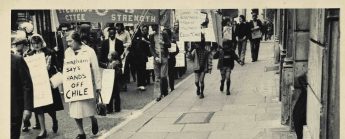
Stephen Wyeth
Last week we set students on our MA in Modern British Studies the following task: Using some of the fantastic diaries in the Cadbury Research Library, write 500 words about a nineteenth or twentieth century diary. Before this we encouraged students to immerse themselves in the work of Carolyn Steedman to reflect on the relationship between lives and stories, on subjectivity and self-fashioning, and how to read material not just for its content – as a source of knowledge about the past – but as a way of understanding the relationship between lives and stories, and the ways in which individuals made sense of the world and the place in it.
Over the next few days we have decided to share their findings. Kicking us yesterday was Jacob Fredrickson on the Diary of William Prince Telfer and then Olivia Perry wrote on the diary of an unidentified woman from 1853. Our final post comes from Stephen Wyeth who writes on the diary of Joseph Ludlow Delarue. Click on our ‘Study with Us’ page for more information on the MA.
It is easy to read the diary of Joseph Ludlow Delarue, and forget the private nature of such a book. The book reads as a conversation, and that is in part what it is.
The diary is perhaps not as private as one would suppose a diary to be, and Delarue himself seems aware that he may one day share these words with someone, so too, does Delarue name the diary as his friend, and it is for these reasons that the diary of Delarue in places reads as a conversation, rather than a record of time.
The structure of the diary at its start flows more like a conversation than a diary, divided primarily into different topics that flow and change, just like a conversation. Yet this does not remain throughout the whole diary, as it progresses, the red ink denoting the topic of the section disappears, and all that remains in the margins, are the dates, written in black ink.
The writings in the diary change little, Delarue is still writing to someone, evident in his explanation of a day dream, he says that “before I proceed, let me bestow two maledictions.” Delarue is evidently talking to someone, whether this is himself, the diary, or a future reader, Delarue’s writings are not as private as a diary might suggest. But the conversation becomes more relaxed, less guided, and more improvised as if the two friends are getting to know each other better.
It is important to note that Delarue is around fifteen to sixteen years old in these writings in his diary, despite Delarue living a century before the advent of the teenager, Delarue can reveal to us this transitional period of life as it was in Victorian Britain. Perhaps the clearest indication of what this stage of life was like can be seen in his writings during the time when he is leaving home.
Delarue laments that he shall never be as happy anywhere as he has been at home,
“no one will attend to me like my mother, no one will love me, or care about me, I shall be my own counsellor, no one care whether I succeed or not.”
Delarue’s lamentation of leaving home reveals to us the sentimentality towards childhood, encapsulated here as a nostalgia for his childhood home and comforts.
Another way that Delarue reveals to us this transitional period in life, is through his daydreams, in one entry he records a number of daydreams, in which he daydreams of fights at school, of playing marbles with childhood friends, but also of the future, and of “his perfect wife”.
Day dreams are an important part of Delarue’s life and identity, as he writes in his miscellany, in a letter on the subject of day dreaming, Delarue extols the virtues of day dreaming, but also reveals to us another part of his identity, his identity as a writer. Delarue states that “every author is a species of daydreamer”, and Delarue’s identity as a writer comes through clearly, not just here, but in his own poetic writings, and his sometimes obsession over certain poets, reveals to us the importance of poetry to Delarue as part of his identity.
